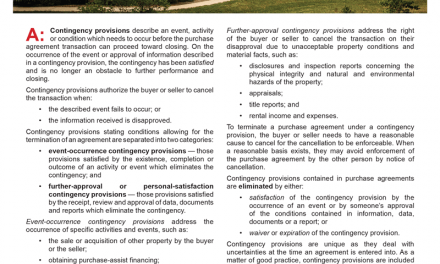This article reviews a creditworthy individual’s entitlement to a loan secured by a fairly appraised home.
California’s fair lending laws
To achieve a healthy state economy, all residential housing placed on the real estate market for sale must be available to any homebuyer who is creditworthy and qualifies for purchase-assist financing. [Calif. Health and Safety Code §35801(b),(c)] | The failure to lend adversely affects the health, welfare and safety of California residents. |
Also, an efficient real estate market requires the value of housing to not be susceptible to fluctuations caused by lenders who arbitrarily deny equity financing to qualified homeowners.
Thus, state law prohibits discriminatory lending practices. The goal of anti-discrimination law in home financing is to:
- increase the amount of housing available to creditworthy buyers; and
- increase lending in communities where lenders have made conventional home loans unavailable. [Health & S C §35802]
Increased availability of home loans
Lenders must make financing available to all qualified, creditworthy loan applicants attempting to acquire loans to:
- buy, build, repair, improve or refinance an existing loan on a one-to-four unit, owner-occupied residence; or
- improve one-to-four unit residences that are not owner-occupied. [Health & S C §35805(d)]
Lenders violate public policy when they indicate a discriminatory preference by denying or approving financing to creditworthy home loan applicants based on the applicant’s:
- race;
- color;
- religion;
- sex;
- marital status;
- national origin; or
- ancestry. [Health & S C §35811]
In a community composed mainly of residents of a certain race, color, religion or other minority status protected by law, a lender cannot:
- refuse to fund a home loan to a creditworthy buyer based on the demographics of that community; or
- appraise real estate in that community at a lower value than that of comparable real estate in communities predominantly composed of non-minority residents. [Health & S C §§35810; 35812]
Failing to provide financing in certain communities, called redlining, is specifically targeted for correction by the law since the failure to lend adversely affects the health, welfare and safety of California residents. [Health & S C §35801(e)(4)]
Lenders who deny loan applications, based on the characteristics of the community in which the real estate offered as security is located, discourage homeownership in the community. Thus, redlining leads to a decline in the quality and quantity of housing in areas where financing is generally unavailable. [Health & S C §35801]
However, a lender can consider neighborhood conditions when making a loan. When doing so, the lender must demonstrate a denial based on neighborhood conditions is necessary to avoid an unsafe and unsound loan as a matter of good business practice. [Health & S C §35810]
For example, a lender is not precluded from considering the fair market value of real estate intended to secure a home loan. A property appraisal, however, cannot be based on the demographic makeup of the area where the real estate is located.
Also, if the property’s topography, structure or location is unsafe or unhealthy for a prospective occupant, the lender is not required to provide purchase-assist financing. [Health & S C §35813]
Notice of loan applicant’s rights
Lenders are required to post, in a conspicuous public location at their place of business, a written notice in no less than 10-point type informing applicants for loans to be secured by an owner-occupied, one-to-four unit residential property of:
- their right to file a lending discrimination claim; and
- the name and address of the Secretary of the California Business, Transportation and Housing Agency (Housing). [Health & S C §35830]
Lenders subject to this posting requirement include state regulated banks, thrifts, public agencies or other institutions which make, arrange or buy loans funded to buy, build, repair, improve or refinance one-to-four unit, owner-occupied housing. [Health & S C §35805]
A home loan applicant who believes he has been unfairly discriminated against by a state lending institution must exhaust the Housing Agency’s administrative remedies before suing the lender for money losses.
However, federally regulated banks and thrifts are not subject to state regulation and discipline. [Conference of Federal Savings and Loans Associations v. Stein (1979) 604 F2d 1256]
Administrative remedies
A loan applicant may file a discrimination claim with the California Secretary of Business, Transportation and Housing Agency against a state regulated lender if the applicant believes his loan application was denied based on:
- his race, color, religion, sex, marital status, national origin or ancestry; or
- trends, conditions or characteristics of the community where the real estate that will secure the loan is located. [Health & S C §§35800 et seq.]
Once the claim is received, the Secretary will attempt to work with the lender to end any unlawful, discriminatory lending practices. [Health & S C §35821]
If, within 30 days of receiving the complaint, the Secretary determines the lender has engaged in an unlawful, discriminatory practice, the Secretary will serve the lender with his written decision and an order compelling the lender to end the unlawful, discriminatory practice. [Health & S C §35822]
The order will also require the lender to pay damages in an amount no greater than $1,000, unless it is still feasible for the lender to review the loan application under nondiscriminatory terms and provide the financing. [Health & S C §35822(a),(b)]
Lender liability
A lender’s failure to provide the same financing and assistance for minority loan applicants subject the lender to liability for money losses. | A minority buyer of real estate submits a loan application to a mortgage broker for a purchase-assist loan.The mortgage broker fails to take the necessary steps to arrange a loan for the minority buyer, and denies the application. Concurrently, the mortgage broker makes or arranges similar financing for a non-minority buyer whose credit record is equivalent to or less worthy than that of the minority buyer. The minority buyer seeks money damages from the mortgage broker for race discrimination. |
The minority buyer claims the mortgage broker’s denial of his loan application is discrimination since the mortgage broker arranged loans for less qualified, non-minority buyers.
The mortgage broker claims he did not discriminate against the minority buyer since the buyer did not qualify for the loan.
Is the mortgage broker liable for money damages for discrimination?
Yes! The mortgage broker’s failure to arrange a loan for the minority buyer, while at the same time arranging loans for less qualified non-minority buyers, is discrimination. [Green v. Rancho Santa Margarita Mortgage Company (1994) 28 CA4th 686]
Also, consider a California-regulated institutional lender or loan broker who regularly arranges alternative forms of financing with a variety of lenders. The lender or broker consistently informs only non-minority loan applicants of their financing options when their loan applications are denied.
The lender’s or loan broker’s failure to diligently provide the same forms of financing and assistance for minority loan applicants subjects the lender or loan broker to liability for the minority applicant’s money losses caused by the discrimination – the selective release of information based on status. [Barber v. Rancho Mortgage & Investment Corp. (1994) 26 CA4th 1819]













